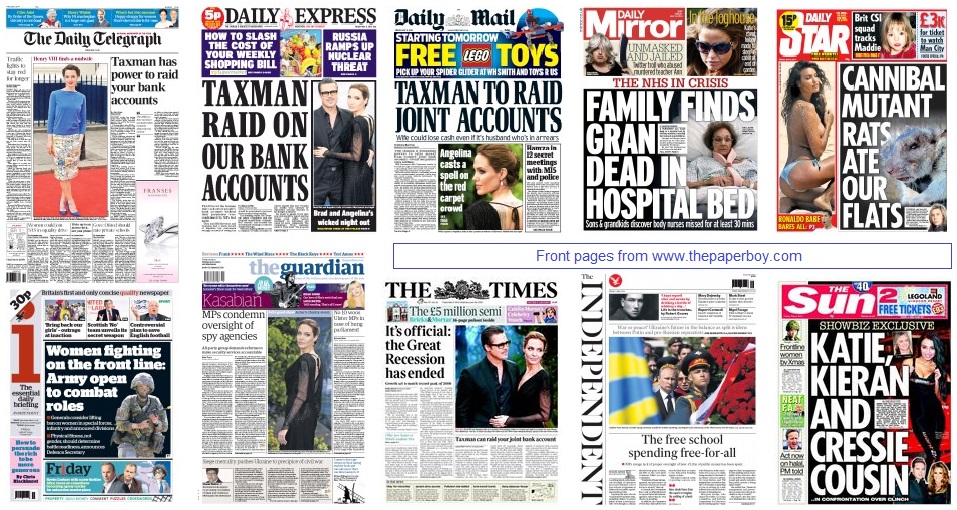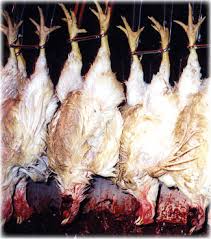The review: Friday 9 May, 2014Tax avoidance...Madeleine McCannThere is just too much to digest on Budget Day, too may folders and files from the Treasury, too many press releases and responses from interested parties. Reporters don't have a chance to read the half of it before they have to start typing.
Surprisingly (or not) a consensus tends to emerge on what kind of Budget it is, who it is aimed at and what are the headline points. This year the consensus was that George Osborne was seeking the pensioner vote. People wouldn't be required to buy annuities when they retired, so they'd have more control over their pension fund. And the tax on bingo was cut. Job done, off to the pub. Most Budgets also have a slow-burner or two that don't catch light for weeks or months after the event. So it was today. The splash headlines in the Telegraph, Mail and Express could have been - and indeed were - written on March 19. What is new today is not that the Revenue will be able to take money from debtors' bank accounts, but that MPs have issued a report saying they aren't sure that this is a good idea. The Mail and Times - which has it as a secondary story on the front - sort of acknowledge that the story isn't new by focusing on access to joint accounts. One party could suffer for the other's profligacy, they say, and the idea that only half of the money in the account could be raided would still be unfair if the partners contributed unequally. This is window dressing. The real news is that the Treasury Select Committee doesn't think HMRC can be trusted to rootle around in people's bank accounts because it's too good at making mistakes and too bad at putting them right. Judging from the headings, executives putting papers together last night seem to have been surprised that such a policy had even been floated. But there it was - briefly - in Osborne's speech and in more detail in the Red Book that is published simultaneously: "We will give HMRC modern powers to collect debts from bank accounts of people who can afford to pay but have repeatedly refused to, like most other Western countries" The financial website This is Money and the bloggers Ian Dunt and Willard Foxton all sounded alarms on the day, describing the idea as a "power grab" and likening it to "one of Wonga's most controversial policies".
The papers also covered the story, but without the fanfare they gave the bingo. Now, thanks to the select committee, they've been able to tell it again as though it were brand new. David Cameron has had to defend the policy, saying taxes would have to rise if it didn't go ahead - and the story has drawn nearly 1,500 readers' comments on the Telegraph's website. Who said news had to be new? 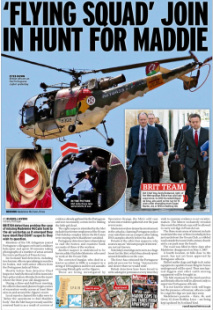 The Mirror's report today The Mirror's report today
Madeleine McCann
We've seen a lot about the British police efforts in Portugal of late: the people they want to question, the plans to dig up parts of Praia da Luz and surrounding areas, the authorities' refusal to allow them to search people's homes. Over the past seven years (yes, it's really that long) we've become used to flurries of activity around the anniversary of Madeleine's disappearance (May 3) and her birthday (May 12), so the current enthusiasm for the story is no surprise. A couple of weeks ago the Sun ran an interview with Kate McCann as she endorsed a new missing child alert initiative. It did seem odd that she should deal with the paper, given her statements to Leveson and the fact that she had only days before signed a letter accusing Rupert Murdoch of scaremongering and untrustworthiness with regard to future press regulation. The rapprochement - if that was what it was - didn't last long. This week Kate and Gerry McCann posted a note on the "find Madeleine" Facebook page expressing dismay at recent media coverage of events in Portugal: 7th of May 2014 - Media Interference 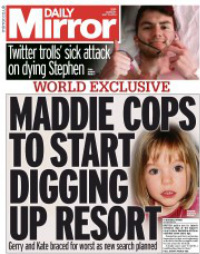 The Mirror on Monday The Mirror on Monday
This was followed by a link to a letter from Assistant Commissioner Mark Rowley to news editors urging them to think carefully about what information they put in the public domain.
As we see from today's papers, the warnings have not stopped continued coverage of the search. Should they have done? On Tuesday the papers were reporting that British police had been refused permission to search the homes of three suspects. The next day everyone except the Independent confirmed that ground radar searches were to be conducted in and near the resort and that there might be some digging. Today we have the helicopter stories we see here. The use of the phrase "media interference" in that Facebook message from the McCanns is curious. Who is interfering in the investigation and how? The probably has apparently arisen over the "last couple of days", which suggests that the couple are talking about the Mirror's scoop on Monday, left. This report included extensive quotes from "a source close to the McCanns" about what was about to happen. It is presumably these quotes that have dismayed the couple and the police. There would, the source says, be "earth diggers everywhere and it will look very dramatic and it will be a heartbreaking and hugely emotional time for Madeleine's poor parents". 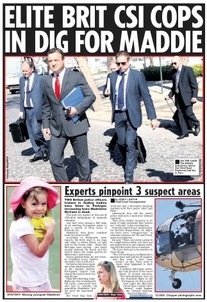 The Daily Star today The Daily Star today
Undoubtedly it will. And it won't have been pleasant for them to have looked at any of the papers this week.
So upsetting yes, but inteference? Perhaps they are referring to derogatory comments made by this source about the earlier investigation by Portuguese police. There has clearly been friction all along the way between the British and Portuguese forces, which hasn't been helped by xenophobic reporting that often starts from the basis that only British cops have any idea of how to do their job. Now the two are finally working together, no one wants anything to upset the applecart. Roy Greenslade wrote in his Guardian blog this week that for the Mirror to report its source's speculation on the McCann's feelings was bad taste and borderline intrusion. He even suggested that that the Press Complaints Commission should step in and make this its valedictory case "before things get out of hand again". SubScribe is a great one for calling for restraint - and would be thrilled never to read another word about this child until she is found. But in this instance is it the journalists who need to show restraint? The level of detail shared by the Mirror's source suggests that the information came from the police or from a confidante of the McCanns. In either case, the problem lies not with the paper, but with the police or the family. It's a simple rule of life: if you want to keep something secret, keep it to yourself. Instead of issuing veiled threats to the Press, Assistant Commissioner Rowley and Mr and Mrs McCann need to tell their officers and friends to shut up. |
|
The hunt for Madeleine
The Sun and Kate McCann Missing an opportunity The Greek Madeleine She's still missing Yesterday's papers
|
Please sign up for SubScribe updates
(no spam, no more than one every week or two)
|
|
|

